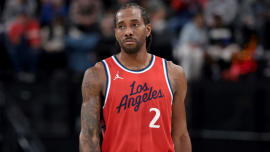The NBA’s collective bargaining agreement is perhaps the most talked about CBA across all professional sports leagues in America, and that’s because of the new second tax apron. When the new CBA went into effect in July 2023, the second tax apron was a huge discussion point because it effectively installed a hard cap on teams for the first time ever. The function of the second tax apron essentially limits high spending teams from continuing to do so above the salary cap without a bunch of consequences tied to it. Now, if a team surpasses that second tax apron, they’ll be hit with several severe penalties that make roster construction incredibly difficult.
This summer, the Boston Celtics made difficult roster decisions in an effort to avoid those penalties. As a result, they traded both Jrue Holiday and Kristaps Porzingis, and let both Luke Kornet and Al Horford walk in free agency. That’s a decent chunk of Boston’s championship core from 2024, and what once looked like a dynasty in the making was quickly broken apart because of the looming threat of the second tax apron. Celtics president of basketball operations Brad Stevens even mentioned that the presence of the second apron is what made Boston break up its championship team, and it’s going to force other teams in the future to do the same thing.
The second apron has been widely criticized, and many have wondered why the player’s union ever agreed to it. But NBA Hall of Famer Charles Barkley doesn’t see it as a bad thing. During an appearance on the Bill Simmons podcast, the outspoken NBA legend turned media personality shared why he thinks the second apron exists, and specifically why the blame is on the players.
“Why did they have to come up with bullshit rules, Bill? Because all these guys want to play together and not compete,” Barkley said. “How many great players do you need on one team? … Why did Adam Silver have to put the second apron in? Because LeBron [James] got all his guys together. [Kevin Durant] wanted to go play with the Warriors. Y’all don’t want to win a championship and just compete against each other? Don’t get mad at Adam Silver because all y’all want to play together and dominate the league because y’all don’t want to compete. I hate when I hear, ‘Man the second apron’s not fair.’ What do you mean it’s not fair? If y’all stopped wanting to play together, we wouldn’t have to make up bogus ass rules to stop y’all from playing together.”
Barkley has long been against superteams in the NBA, and has criticized multiple star players for wanting to team up with other stars in an effort to win a championship. So it’s not surprising he correlated these two things together, and in a way, he’s not entirely wrong about what the second apron is doing. Because of all the restrictions that come with being a second tax apron team, it does limit a franchise’s ability to add multiple superstar players on one roster like the Warriors in the 2010s and the Heat‘s big three before that.
Kawhi Leonard contract drama, explained: Clippers, Steve Ballmer accused of $28 million NBA salary cap evasion
Sam Quinn

The second apron was also added in an effort to create competitive balance between super rich owners in big markets and smaller market teams that cannot spend as much. As a result, we may not see very many superteams with multiple superstar-level players again in the near future. The Oklahoma City Thunder are perhaps the only team that falls into the “superteam” criteria right now, and while many expect them to fall to the same fate the Celtics met this summer, OKC’s in a unique position because of the endless amount of draft picks at their disposal to remain competitive for at least the next decade.
Barkley did concede a tiny bit to admit the second apron isn’t really a great thing, but believes it’s all because of players wanting to team up with other superstars.
“This is a bogus rule, I agree with you, but if all these guys didn’t want to play together, Adam Silver wouldn’t have had to make up rules,” Barkley said.
Teams will have to navigate the second apron until the CBA expires in 2030, or if either side opts out in 2029. Given how limiting its made things for teams, it wouldn’t be surprising to see the player’s union opt out to negotiate for a less restrictive tax apron. Until then, the teams that can figure out how to build a championship team while operating under the second apron will have the upper hand over the next four years.






